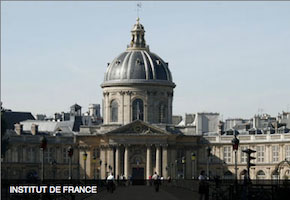Academic Events
Institut de France
‘Parliament of scholars’ or ‘parliament of knowledge’ – the Institut de France was established in October 1795. Its primary role is to gather and bring together scientists, literary persons and artists. The missions of the Institut de France are to develop the arts and sciences according to the principle of multidisciplinarity and to manage the thousands of donations, bequests and foundations for which the Institut is a depository.
As a guardian of analytical and independent thinking, invested in research and open to the world issues, the Institut, in many respects, is primarily a counsellor for public authorities. Public authorities refer to the Institute, making requests for reports or opinions. The Institut consists of five academies. Each one of them has a role of its own within its area of competence: the French Academy is concerned with the French language, the Académie des inscriptions et belles-lettres studies classical antiquity, Orientalism, the Middle Ages and the Renaissance. The Academy of Sciences develops its action and its reflection in the field of mathematics, physics, chemistry, nature, biology, and medicine. The Academy of Fine Arts reviews and promotes the various artistic disciplines. The Academy of Ethic and Political Sciences addresses major issues relating social sciences, law and economics. The Institut and the Academies engage in philanthropic actions through sheltered foundations. The Duc d’Aumale is the historic patron of the Institut de France. Since the XVIIIe century, many have directly, or through the creation of foundations, bequeathed to the Institute or to the Academies all or part of their assets requesting that they be used for social, moral or scientific purposes. Today, this sponsorship is an important part of the work of the members of the Institute who work with foundations and provide expertise and ensure best practices. Foundations housed at the Institute or from the academies share the same sense of generosity but at the same time illustrate a variety of concerns, ranging from the development of museum foundations to the support of innovative projects or eminent persons those deserving or in need. This is unique to the Institut. It is an institution where ‘all the efforts of the human mind are related to a beam’ (Ernest Renan) . A place for exchanges among the greatest scientists of the Republic, public authorities, sponsors (companies or individuals) and men – known and unknown – contributing to the common good.









